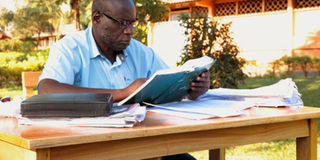40 years of loyalty to teaching

At 65, Nditounzeh Mwene Banyuzahabo says he still treasures teaching the same way he did when he joined the profession 40 years ago. Photo by Phionah Nassanga
With more than 40 years in the classroom, Nditounzeh Mwene Banyuzahabo, 65, is not about to let go of the red pen. He continues to teach even after his retirement in 2015.
Banyuzahabo has been a chief examiner for the last 23 years and currently, he is teaching Divinity at Lubiri Secondary School and Lincoln Secondary School, Mukono.
Born to the late Petero Banyuzahabo and Gaudensia Nyiramfa, Banyuzahabo is the fourth child of 12 siblings. He does not come from a rosy family background; far from it and because of this, his education did not come on a silver platter. He attended school in a war torn environment and witnessed teachers coming to teach in slippers and some with torn clothes. However, that did not stop him from becoming a teacher.
“I started school at seven at Kimanya Sacrament Primary School, Masaka with no idea of who I would turn out to be,” he recalls.
At the age of 14, Banyuzahabo was selected to interpret words from English to Runyakitara for the natives in his community.
Hurdles
“In Primary Seven David Freeman, a white preacher from Masaka Full Gospel Church, held a prayer conference in my community. Someone was selected to interpret for the natives, but the congregation was not happy with their work. And so I was selected as a suitable candidate for the job,” he recalls.
After the conference, Banyuzahabo says he was praised for the job well done. However, his late father was not happy about his son interpreting for the white man.
“If you can speak English that means you can also work in a white man’s office. Why then should I waste money paying your school fees,” Banyuzahabo recalls his father’s comment. Since that time he never received school fees from his father again.
With no hope of joining secondary school, Banyuzahabo worked hard during his Primary Leaving Examinations to secure a district scholarship but he missed it by seven points after scoring 203 instead of 210 and above.
Lady luck
Despite this, Banyuzahabo, says, he was the only one among his siblings to ever study beyond Primary Seven as the rest stopped in either Primary Four or Primary Three.
However, as luck may have it, someone else willing to take him through school showed up. “My uncle offered to pay for my secondary school education even if it did not last.”
And although he would have loved to press on, Banyuzahabo became one of the famous school fees defaulters. Because of this, he decided to stay home and save the little money his uncle gave him to register for his Senior Four final exams.
He would borrow books from friends and read and in 1976 he sat the exams at St. Benda’s College Masaka.
The calling
He admired how priests related and worked with everyone in the community, so he thought of becoming one because, he thought that would put him in a better position to serve and work with everyone as he desired. However, while at the seminary he realised priesthood was not his calling. “I realised what I really wanted was to be in a profession that impacts other people’s lives.”
And so he left the seminary and joined a teachers’ training college. He graduated as a primary school teacher and was posted to Busubi Primary School in Masaka. He was later on transferred to Busibi Primary School in Mityana
He was ambitious and this drove him to joining A-Level just so he would eventually study to become a secondary school teacher. “In 1983 while at Busibi Primary School, I was offered a scholarship to join Mityana Secondary School to study Senior Five and Six,” he recounts.
He passed with 12 points but missed pursuing a bachelor’s degree in education by 0.5 points. Instead he was offered a diploma in education at Mubede Teachers College.
“My first teaching practice was at Mitiyana Secondary School from 1986 to 1987. I have not looked back since then.”
His relevance?
Banyuzahabo says building relationships with students and commitment to his work have made him relevant for the past 40 years. However, he says this requires a delicate balance in all his classroom obligations; which means dedicating enough time to both the students and the school.
He also notes that when you are a teacher, you are expected to keep reading because any teacher that is not prepared to read is in the wrong profession. “Teaching is an honourable profession. It is not an easy job and that makes it even more worthwhile.”
Worst moment
“In 1990 While at Ishaka Adventist College, one of my students who was suffering from measles died at school. It was a bad incident for the school, especially for me as a head teacher. Imagine a parent sends their child to you in a good health but return a dead body to them,” he recalls sadly.
Banyuzahabo advises teachers to be careful especially with students who stay in hostels, and those in boarding schools because anything fatal sometimes can happen.
Education sector
Compared to the 1990s Banyuzahabo thinks the education sector has changed but largely not for the better.
“The education sector has focused more on monetary benefits than teaching,” he asserts. He adds that schools currently compete to make names, admit big numbers and as a result students are only being taught to pass exams not to understand. In terms of school fees, Banyuzahabo notes that there is no difference between what a nursery, primary, secondary and university student pays.
Schools he has taught in
•Ishaka Adventist College
•Kyamuhunga
•Bweranyangi
•Lubiri SS
•Bishop’s SSS
•Nyabubare SS
•Kaseuyi SS Mubende
•Naama SSS Mityana
•Lincoln SS Mukono




